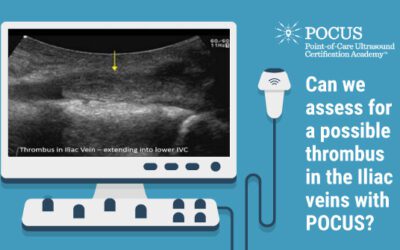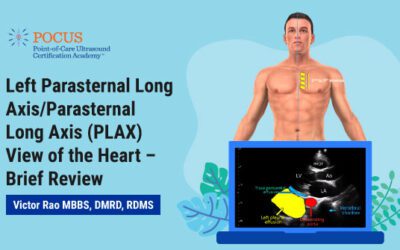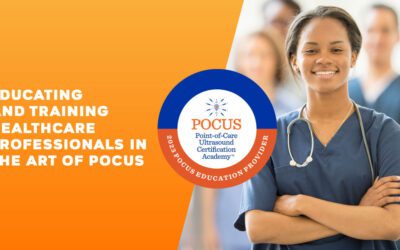Learning Objectives
- Learning from History
- The Medical Tradition
- The Challenge: Disrupt or Complement?
- Mirroring Tradition with Technology
- The Unique Advantages of Ultrasound
- Obstacles to POCUS becoming Culture
- Key’s to POCUS becoming culture: Building POCUS Curricula Consistent with the Medical Tradition
Resources
Are you a family medicine resident interested in learning more about POCUS? The American Academy of Family Physicians Recommended Curriculum Guidelines for Family Medicine Residents Point-of-Care Ultrasound outlines a recommended training strategy to help residents develop the knowledge and skills needed to use POCUS in clinical practice.
Education and training barriers have prevented internal medicine from experiencing the same growth and integration of POCUS that other fields have witnessed. To explore how internal residency programs can overcome these hurdles, read A road map for point-of-care ultrasound training in internal medicine residency as published in the Ultrasound Journal.
As the number of coronavirus cases continues to grow around the world, many healthcare workers have found point-of-care ultrasound to be a useful diagnostic tool during the pandemic. Read to find out how healthcare workers are using POCUS to help diagnose COVID-19 and what this could mean for the future of imaging.
Interested in learning more about POCUS? Philips healthcare offers an introduction to point-of-care ultrasound technology and an overview of virtual resources to help readers learn more.
Bernard E. Bulwer, MD, FASE.
… Considered an “outside the box”, “visionary and strategic thinker”, and a physician “ahead of his time”, by leading experts at Harvard, Colombia, and the Cleveland Clinic, and beyond.
… Also called the “Leonardo da Vinci and the Frank Netter of Echocardiography”
Dr. Bulwer’s focus is to “educate and equip” today’s students and practitioners with the foundation tools for responsible use cardiac ultrasound “echo” stethoscopes – within their scope of training. Such tools are designed to complement medical education, diagnostic medical sonography programs, clinical practice, and global health.
Dr. Bulwer, a native of Belize, was recognized (by the U.S. government) as a “person of extraordinary ability” based on his contribution in the field of echocardiography education.
He has served as author, co-author, editor, and medical illustrator of a number of textbooks and didactic works in echocardiography. These include:
————
Co-Editor-Author: Braunwald Heart Disease Companion Textbook: Essential Echocardiography (2018):
https://www.linkedin.com/feed/update/urn:li:activity:6472029048515235840
Author Page:
https://www.amazon.com/Bernard-E.-Bulwer/e/B001JPCKTO
Books:
1. Transthoracic Echocardiography- Foundations, 3rd. ed, 590 pages (2020): https://www.linkedin.com/posts/bernard-e-bulwer-m-d-fase-6096ab85_tte-foundations-3rd-edition-pub-date-4-activity-6659533568651345922-05UB
Vol 8. How To Do An Echo Exam, 3rd ed., 590 pages (2020):
https://www.linkedin.com/posts/bernard-e-bulwer-m-d-fase-6096ab85_how-to-do-an-echo-exam-3rd-ed-april-26-activity-6661626779406487552-gEKK
Vol 9. Introduction to Doppler Ultrasound Physics: B-Mode Echocardiography, 310 pages (2020): https://www.linkedin.com/posts/bernard-e-bulwer-m-d-fase-6096ab85_ultrasound-physics-introduction-to-doppler-activity-6661259469516865537-8TG9
Vol 10. Ultrasound Physics: B-Mode Echocardiography and Introduction to Doppler, 590 pages (2020)
https://www.linkedin.com/posts/bernard-e-bulwer-m-d-fase-6096ab85_ultrasound-physics-uniquely-illustrated-activity-6653618663582773248-Bz-w
PROJECT: Echo Stethoscope Academy: https://echoscope.org/
Essential Echocardiography: A Practical Handbook with DVD (2007, Humana Press/Springer Science), with Scott D. Solomon, MD and Foreword by Peter Libby, MD (Brigham and Women’s Hospital-Harvard Medical School).
Volumes 1-10: Echocardiography Illustrated Series (Volumes 1-10): https://www.amazon.com/Bernard-E.-Bulwer/e/B001JPCKTO
Email us at POCUS@Inteleos.org for more information.
Disclaimers:
























